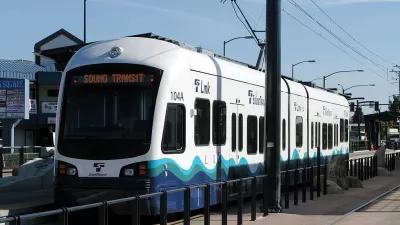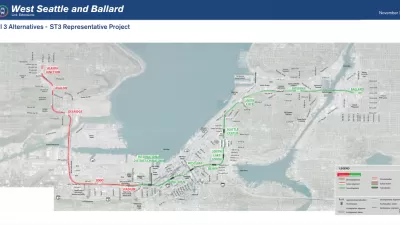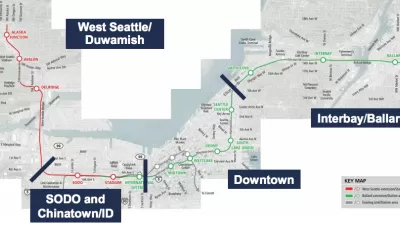Sound Transit is moving forward with a proposed route despite severe cost overruns, throwing other major rail projects into question.

Sound Transit revealed higher-than-expected projected cost overruns for the West Seattle Link Extension project, reports Ryan Packer in The Urbanist, but the Sound Transit board indicated it would continue to support the project without considering alternative options. The project is now estimated to cost as much as $7.1 billion, close to $3 billion more than initial projections.
According to Packer, “Even as the agency touts internal reforms that it says could bring some of these cost increases down to more manageable levels and help Sound Transit regain some ground, there are storm clouds brewing when it comes to the affordability of the entire Sound Transit 3 program.”
Packer outlines other potential options that could save the agency money, such as the Elevated Fauntleroy Way alternative, which could reduce costs by as much as $850 million. But according to Sound Transit CEO Goran Sparrman, “The reality is that the kind of cost escalation we’re seeing on the preferred alignment, that is a largely [sic] driven by broader market forces, so I don’t know that we would expect to see significant lower cost in any other alternatives.”
For Packer, the cost increases pose a broader question about the future of the ST3 program and the Ballard Link project, a ‘sister project’ to the West Seattle extension that could cost $11.2 billion.
FULL STORY: Sound Transit Board Forges Ahead on West Seattle Link Despite Cost Jumps

Study: Maui’s Plan to Convert Vacation Rentals to Long-Term Housing Could Cause Nearly $1 Billion Economic Loss
The plan would reduce visitor accommodation by 25,% resulting in 1,900 jobs lost.

North Texas Transit Leaders Tout Benefits of TOD for Growing Region
At a summit focused on transit-oriented development, policymakers discussed how North Texas’ expanded light rail system can serve as a tool for economic growth.

Why Should We Subsidize Public Transportation?
Many public transit agencies face financial stress due to rising costs, declining fare revenue, and declining subsidies. Transit advocates must provide a strong business case for increasing public transit funding.

How to Make US Trains Faster
Changes to boarding platforms and a switch to electric trains could improve U.S. passenger rail service without the added cost of high-speed rail.

Columbia’s Revitalized ‘Loop’ Is a Hub for Local Entrepreneurs
A focus on small businesses is helping a commercial corridor in Columbia, Missouri thrive.

Invasive Insect Threatens Minnesota’s Ash Forests
The Emerald Ash Borer is a rapidly spreading invasive pest threatening Minnesota’s ash trees, and homeowners are encouraged to plant diverse replacement species, avoid moving ash firewood, and monitor for signs of infestation.
Urban Design for Planners 1: Software Tools
This six-course series explores essential urban design concepts using open source software and equips planners with the tools they need to participate fully in the urban design process.
Planning for Universal Design
Learn the tools for implementing Universal Design in planning regulations.
Ascent Environmental
Borough of Carlisle
Institute for Housing and Urban Development Studies (IHS)
City of Grandview
Harvard GSD Executive Education
Toledo-Lucas County Plan Commissions
Salt Lake City
NYU Wagner Graduate School of Public Service





























